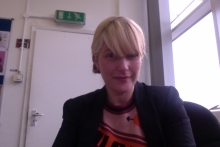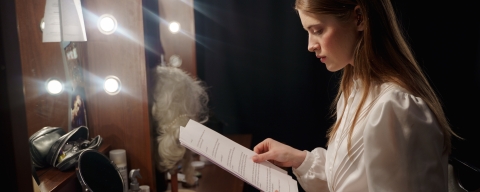
Key information
UCAS code:
W810
Typical offer:
112-120 UCAS points to include a minimum of 2 A levels, or equivalent
Clearing Hotline: 023 9284 8074
Showing content for section Overview
Overview
Apply now through Clearing
If you have your results, you can apply directly to us now to start in September 2024.
Blend your love of film with your passion for writing on our BA (Hons) Screenwriting degree course.
You'll write scripts, see your work produced on screen, study screenplays and hone your writing skills with industry-experienced lecturers and mentors. You'll explore theories and genres of film and writing through history, study how they might evolve in the future, and experience the craft of filmmaking both as critic and creator.
Through close integration with our film production degrees, you'll discover how screenwriting interconnects to other specialisms within filmmaking, preparing you to write short stories, create scripts and produce screenplays with industry-wide insight.
You'll have the chance to learn practical production skills (such as camera work and editing) that'll enrich your ability to tell stories through film and enable you to produce your own screenplays from start to finish. Collaborating with drama and performance students, you’ll see your scripts brought to life on screen.
Once you graduate, you'll have skills that will set you on the path for a career in the creative sector, particularly the film industry as a screenwriter, script editor, researcher, producer or showrunner. Other career paths include journalism, marketing, public relations and teaching.
Course highlights
- Learn the skills essential for a screenwriting career, including script timing and editing, continuity, researching, and using industry-standard scriptwriting software
- Be taught by an expert teaching team that includes professional screenwriters with national and international experience, plus published novelists and journalists, prestigious magazine editors, script editors, academic researchers, and performance poets
- Collaborate with film production, television production, performance, theatre and other writing students within the thriving creative schools of Film, Media and Communication and Art, Design and Performance
- Discover how screenplays and scripts come to life by trying your hand at camera work, editing and short filmmaking, and have the option to achieve Avid Media Composer editing certification
- Take part in Portsmouth's annual Comic Con for the latest developments in creative writing and literature, popular culture, fan communities, and technology – course lecturers and students are panellists
- Benefit from our active connections with children’s TV and soap opera creators, and local independent creatives at No6 Cinema and Making Waves film festival
- Build your writing portfolio by contributing to our course blog The Eldon Review and hyperlocal news zine Star & Crescent
- Take advantage of great transport links to London - ideal for networking with agents and industry contacts
- Gain valuable professional experience by taking an optional placement in the creative industries
- Experience another culture and way of learning by studying abroad for a year or a single semester
- Boost your lingual abilities by learning a language with our extra-curricular Institute-Wide Language Programme – and earn credits for it
Top 30
for student satisfaction
(Times Higher Education, 2024)
Contact information
Contact AdmissionsClearing Hotline: 023 9284 8074
Clearing is open
This course is available through Clearing.
Apply now through Clearing
If you have your results, you can apply directly to us now to start in September 2024.
Guaranteed accommodation

Connected Degrees®
Only at Portsmouth you have the choice to take a traditional sandwich placement before your third year, or to take your placement after your final year.
Upbeat music plays over information about Connected Degrees® from the University of Portsmouth.
Discover how Clearing works
Clearing 2024 opens on 5 July and closes on 21 October
Every year thousands of students find their ideal undergraduate course through Clearing. Clearing matches students who are looking for a different course or university from their original choice, or who are applying for the very first time after 30 June, to courses that universities still have places on.
The majority of people apply through Clearing once they receive their exam results on A level / T level results day (15 August 2024).
You can apply through Clearing if:
- You don't meet the conditions of your offer for your firm (first) or insurance (second) choice courses
- Your exam results are better than you expected and you want to change your course or university
- You don't hold any offers
- You've accepted an offer but changed your mind about the course you want to do
- You're applying for the first time after 30 June 2024
Yes, we welcome Clearing applications from international students and you can apply in exactly the same way as UK students do.
The majority of UK students apply through Clearing once they receive their A level / T level results in August 2024, so as an international student if you already have your exam results you can apply when Clearing opens.
Make sure that you have time to get your visa, funding, and English language certification sorted out before the beginning of term.
If you would like further information or guidance, please contact our international office for advice.
The entry requirements for courses can change in Clearing but if you want an idea of what grades we usually accept, take a look at our undergraduate course pages.
Even if you don't quite meet the entry requirements, we'd still encourage you to apply as you could still get a place.
Book your place at our Clearing visit day
Join us on campus Thursday 8 August, 10am-3pm
Yes, our four career-focused undergraduate courses at our growing London campus are available to apply for through Clearing.
Webinar: Applying to uni through Clearing
Yes, you can join our webinar on Tue, Aug 6, 2024 4:00 PM - 5:00 PM BST and we'll tell you all about the Clearing process.
Clearing Hotline: 023 9284 8074
Entry requirements
BA (Hons) Screenwriting requirements
Typical offers
- A levels - BBB-BBC
- UCAS points - 112-120 points to include a minimum of 2 A levels, or equivalent (calculate your UCAS points)
- T-levels - Merit
- BTECs (Extended Diplomas) - DDM-DMM
- International Baccalaureate - 25
A relevant subject or experience in English/Creative Writing/Journalism/Media or Film Studies is required. Applicants without a relevant subject or experience will be asked to provide a portfolio to support their application.
You may need to have studied specific subjects – find full entry requirements and other qualifications we accept.
Selection process
A relevant subject or experience in English/Creative Writing/Journalism/Media or Film Studies is required.
Applicants without a relevant subject or experience will be asked to provide a portfolio to support their application.
For more information on how to put together a portfolio, read our Creative Writing courses portfolio guide.
English language requirements
- English language proficiency at a minimum of IELTS band 6.0 with no component score below 5.5.
See alternative English language qualifications.
We also accept other standard English tests and qualifications, as long as they meet the minimum requirements of your course.
If you don't meet the English language requirements yet, you can achieve the level you need by successfully completing a pre-sessional English programme before you start your course.
Typical offers
- A levels - BBB-BBC
- UCAS points - 112-120 points to include a minimum of 2 A levels, or equivalent (calculate your UCAS points)
- T-levels - Merit
- BTECs (Extended Diplomas) - DDM-DMM
- International Baccalaureate - 25
A relevant subject or experience in English/Creative Writing/Journalism/Media or Film Studies is required. Applicants without a relevant subject or experience will be asked to provide a portfolio to support their application.
You may need to have studied specific subjects or GCSEs - see full entry requirements and other qualifications we accept.
Selection process
A relevant subject or experience in English/Creative Writing/Journalism/Media or Film Studies is required.
Applicants without a relevant subject or experience will be asked to provide a portfolio to support their application.
For more information on how to put together a portfolio, read our Creative Writing courses portfolio guide.
English language requirements
- English language proficiency at a minimum of IELTS band 6.0 with no component score below 5.5.
See alternative English language qualifications.
We also accept other standard English tests and qualifications, as long as they meet the minimum requirements of your course.
If you don't meet the English language requirements yet, you can achieve the level you need by successfully completing a pre-sessional English programme before you start your course.
We look at more than just your grades
While we consider your grades when making an offer, we also carefully look at your circumstances and other factors to assess your potential. These include whether you live and work in the region and your personal and family circumstances which we assess using established data.
How to prepare for this course
Here are two ways you can get ready for all the exciting writing you'll be doing over the next three years.
Reading books
We have some recommended titles you can check out:
- ‘The Artist’s Way’ (Julia Cameron)
- ‘Into the Woods: How Stories Work and Why We Tell Them’ (John Yorke)
- ‘Story’ (Robert McKee)
All of these appear in this course’s module reading list, so buying them could be worthwhile – or you could wait until you can access them in our University Library or on our Moodle pages after starting this course.
You can also read freely available screenplays and scripts online to help you become familiar with how they work.
Writing
Write every day; don’t throw any of it away.
Writing's the easiest and most important way to prepare for a screenwriting course. The more you write, the more you’ll:
- discover your voice
- hone your technique
- become more self-reflective
You don’t have to pen a major publication or a future blockbuster screenplay either. You can start small by keeping a diary, journal, or setting up your own blog, and adding entries to those.
Facilities
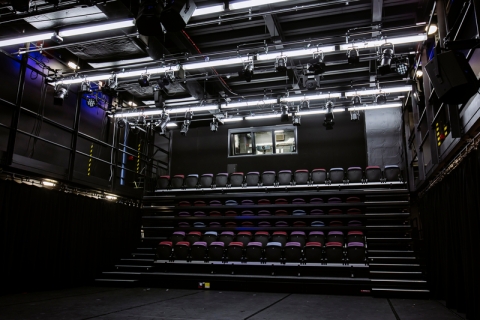
White Swan Building
Our drama and theatre hub was developed in partnership with Portsmouth’s esteemed New Theatre Royal. It has all the spaces and equipment you need for stage and performance productions: from rehearsal to final act.
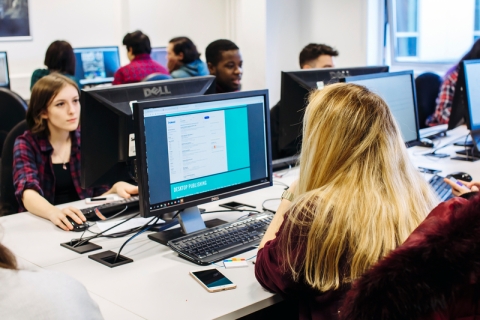
Open Access Suite
Our open-plan space includes PCs and Macs equipped with Adobe Creative Suite and other professional software.
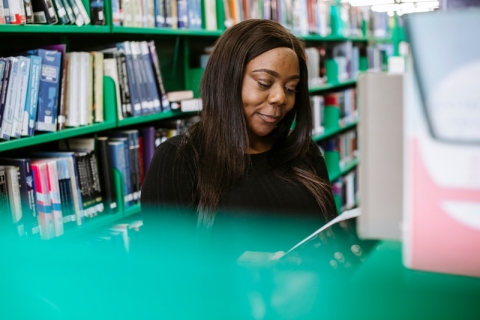
University Library
Our University Library is home to not only publications you'll need for your studies but also rare archives and special book collections that will help kindle your writing fire.
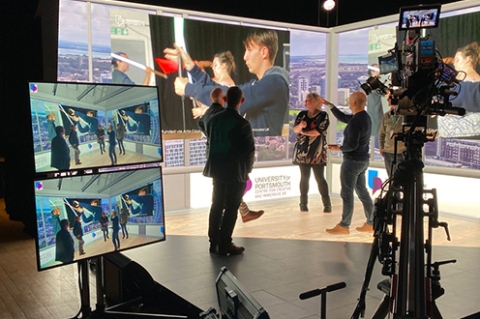
CCIXR
Get to grips with writing for virtual production in our Centre for Creative and Immersive Extended Reality, where you can experiment with tech such as green screen and motion capture.
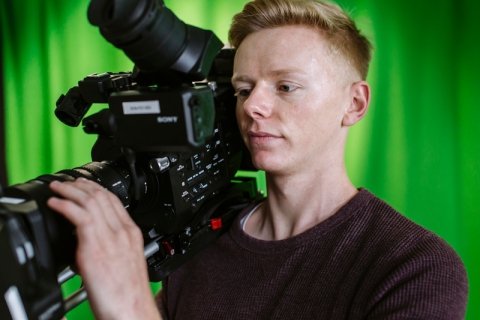
Professional TV and film cameras
Broadcast and film in crystal clarity with our range of industry-level cameras from Sony, JVC, Canon and Arri, including Arri Alexa cinema camera systems used by professional cinematographers.

Writing and scripting software
Pen film, TV and stage masterpieces using industry-wide scriptwriting software such as Celtx and Final Draft.
Careers and opportunities
The UK film and TV industries are thriving - production hubs have formed across the country in locations including Liverpool, Glasgow, Cardiff and Birmingham, and a record-breaking £5.6 billion has been invested in new content for the big and small screens since 2020 (British Film Institute).
As well as preparing you for opportunities as a new screenwriter [soaps and children’s TV are both great starting areas for new writers], this degree will make you an excellent candidate for other related roles in this flourishing industry.
You'll have the critical awareness, creative ability and project management skills to go after graduate roles in script editing, researching, development production and showrunning, or to work in other creative media besides film, television and the stage, such as video games and graphic novels.
You can also continue your studies to postgraduate level or take further teacher training to work in education.
Graduate areas
Areas graduates from our creative industries courses have worked in include:
- film and television
- radio and theatre
- advertising and marketing
- arts and events management
- local and community broadcasting
- teaching
- stand-up comedy
- travel industry
Graduate roles
Roles graduates from our creative industries courses have gone onto include:
- script editor
- screenwriter
- novelist
- poet
- playwright
- teacher
- copywriter
- journalist
- theatre manager
- editorial assistant
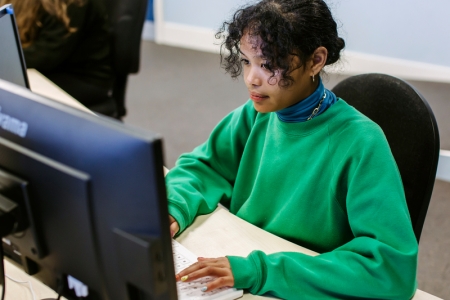
Ongoing career support – up to 5 years after you graduate
Get experience while you study, with support to find part-time jobs, volunteering opportunities, and work experience.
Towards the end of your degree and for up to five years after graduation, you’ll receive one-to-one support from our Graduate Recruitment Consultancy to help you find your perfect role.
Placement year (optional)
After your second or third year, you can complete an optional work placement to gain professional experience and enhance your skills. It's also a great incentive for employers once you graduate.
You can work for a company, organisation or agency, or you can go self-employed and start your own business with fellow students or by yourself.
Whatever you decide – or even if you just want some employability advice – our exclusive Creative Careers team can support you every step of the way.
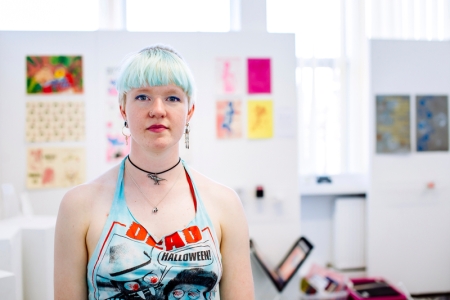
Creative Careers
Our in-faculty Creative Careers team has extensive recruitment experience and knows the creative sector well, making it easier for students to find placements within the creative industries.
They can guide you through every step of the application process, including:
- Searching for the ideal job through their database of vacancies
- Giving tips on how to write an interesting CV that will catch employers' attention, no matter the role
- Organising mock interviews, so you can hone your technique and familiarise yourself with the recruitment environment
- Writing your startup business proposal – if you're going down the self-employment route
The team will continue to give you support throughout your placement year.
Placement experiences
Placement students on our creative industries courses have worked in a variety of roles in commerce, publishing, entertainment, and education, and for some of the most well-known broadcasting and tech companies, such as Sky, Disney and Sony UK. Others have chosen to work for themselves.
Among these experiences are:
- Digital content creator at the head office of a major retailer
- Trainee editorial assistants at The London Magazine and Star & Crescent
- Writing and publishing novellas and poetry collections as a freelancer
- Content writer for a Brixton music promotion company
- Teachers in schools

What you can do on a placement year
If you're thinking of doing a placement but not sure what role to take or where to go, we can steer you in a direction that fits your aspirations.
Check out our Creative Careers team's blog to find out where fellow film, media and communication students have interned during their studies.
Modules
Each module on this course is worth a certain number of credits.
In each year, you need to study modules worth a total of 120 credits. For example, four modules worth 20 credits and one module worth 40 credits.
What you'll study
Core modules
You'll learn about shooting with a single camera and everything that goes into making a film, from the inception of an idea to the final edit.
In workshops, you will get to try your hand at using a camera, setting up lights, recording sound, and editing videos on a computer. You will have the opportunity to take on important roles such as director, cinematographer, editor, or producer.
We will explore different filmmakers and types of movies and observe how culture and identity influence their work. This will help you incorporate similar techniques in your own films.
Additionally, you will work with a small team, improving your communication, teamwork, and project management skills.
Understanding your own skills, interests and motivations, you'll explore your future career decisions.
Insights from academics and professionals will inform your knowledge of required skills and qualities in creative tech. And you'll critically assess technological, ethical and commercial challenges and opportunities in contemporary film and TV.
This module is designed to sharpen your analytical skills, enabling you to effectively interpret and critique various elements of narrative screen media such as mise-en-scène, editing, performance, and sound/music.
You will engage in seminars and screening workshops that introduce you to a broad spectrum of conceptual frameworks, shaping the academic analysis of screen media. The topics you explore will be diverse, ranging from authorship, genre, adaptation, to realism and representation. The module also brings interdisciplinary perspectives from literary theory, psychoanalysis, cognitive psychology, and philosophy to enrich your understanding of film and media analysis.
By the end of this module, you'll not only be proficient in analysing screen media but also in articulating your insights and arguments in line with contemporary academic discourse.
Delve into the critical thinking and academic theory behind successful writing through engaging lectures, case studies, and presentations. Pick up skills and strategies from renowned writers, examining how creativity and technique fuse to create vivid narratives. Put this knowledge into practice by writing your own unique piece, using the methods of the authors you admire to shape your own voice.
This module offers the core inspiration and practical guidance to elevate your writing to university. You’ll discover both the magic and methodology of creativity—the key ingredients for a fulfilling writing career.
You’ll tap into your memories and senses to explore identity across poetry, prose, and hybrid forms. Study memoirs, both factual and fictional, and create your own while keeping a journal of your progress.
Through in-class peer reviews, you’ll give and receive feedback to develop insight and technique. By semester’s end, you’ll submit portfolios showcasing your best autobiographical writing.
This module will guide you in skilfully incorporating personal stories into your writing, teaching you to express authenticity with creative finesse. By the end, you’ll understand deeply how to transform personal experiences into fascinating literature and have original work that shows your ability to capture and convey truth through creative expression.
The course will cover traditional storytelling techniques through different writing projects. As you progress, you will learn how to create proposals and scripts that meet the industry standards. This will enable you to become a better storyteller.
Additionally, you will learn how to deliver your ideas in an impressive and captivating manner. This will help you manage your time more effectively. By exploring the creative methods used in major films and TV shows, you will gain a profound understanding of the storytelling process.
Upon completing this module, you will be well-equipped to begin your career as a writer in the film and TV industry.
Core modules
This module covers important themes, film studios, producers, and laws that have shaped the film culture in the UK.
By examining how movies depict race, gender, and class, you'll gain valuable insights into how the film industry operates, including the process of movie-making and the way films are received.
Using primary sources, you'll gain a solid understanding of the history of the British film industry and engage in discussions about the concept of British identity.
This module is an excellent opportunity to appreciate a crucial aspect of British culture.
Analysing diverse screen languages and conventions, you'll enhance your creativity, and comparing story structures and narrative needs of global production will broaden your perspective. You'll learn to understand target audiences and emerging platforms, to prepare you for working a the global marketplace.
With script drafting and redrafting practice, you'll gain industry-applicable writing talents. Through acclaimed script analysis, you'll appreciate what makes great screenwriting.
You will pitch your ideas, write proposals and manage the production process.
Additionally, you will learn about the language and rules of filmmaking which will help you make artistic decisions that will engage your viewers. You will gain experience in filming and editing and produce a polished film.
Once your film is ready, you will develop a marketing strategy for screenings and distribution. You will learn to work with others and understand how to get your film out into the world.
Overall, this module provides an invaluable experience of the fiction filmmaking process and supports you in making your vision a reality.
Analyse the artistic, political, and economic aspects of films in postcolonialism and global cinema. Critically examine different themes and the methods filmmakers use. Understanding the evolution of film production, you’ll learn about the impact of technology on movies both locally and internationally. By looking at how films are distributed and marketed, you’ll learn about the impact of global politics on how films are received.
You’ll come to understand international films deeply, developing cultural knowledge.
This understanding will enhance your analytical abilities, which are useful for jobs in film programming, curating, and reviewing.
Optional modules
Through a study exchange overseas, you will manage tasks and projects relevant to your course, working independently or collaboratively as part of a team.
The experience enables you to showcase your talents on a global stage while reflecting on your personal growth. With enhanced employability prospects, you return home with a new perspective to inform your practice.
You'll analyse key crime writing texts from detective fiction to philosophical writings on crime and punishment, considering the way they represent criminals, the police, the ethics of the death penalty, as well as historical contexts and theoretical approaches.
This module invites you on an investigative journey through the ethics, identities and politics underpinning tales of crime.
You will get the opportunity to study classic and modern stories from different genres, including crime and flash fiction, which will help you learn about literary styles. Moreover, you will practice writing for different age groups, such as adults, young adults, and children, and adapt your writing style accordingly.
Throughout the module, you will turn your ideas into complete stories and develop a portfolio of your work. You will also get the chance to improve your creative process through discussions and self-assessment. In addition, you will experience the publishing world by pitching a story to a magazine.
By the end of the module, you will have discovered your unique storytelling voice and created captivating short fiction.
Through a study exchange overseas, you will manage tasks and projects relevant to your course, working independently or collaboratively as part of a team.
The experience enables you to showcase your talents on a global stage while reflecting on your personal growth. With enhanced employability prospects, you return home with a new perspective to inform your practice.
This philosophy-driven module invites you to examine key texts, collaborating with experts to dissect celebrated literature. Equipped with fresh analytical methods and understanding, you’ll apply what you learn directly in practical workshops. Through a mix of lectures, detailed reading, timed essays, and presentations, you’ll integrate philosophical concepts, using age-old wisdom to improve your writing craft.
Immerse yourself in the intellectual heritage of literature and become a more profound and reflective writer.
Join a team of creative students and do a project together. Try new things and see how they can help you.
You’ll also grasp how to use your skills with others. Sometimes you’ll be a leader, sometimes a helper. Talk about your ideas and learn from them. You’ll make something to show what you learned and share it with others.
This module helps you gain new skills and understand other fields. You’ll be a smart and creative person, ready to solve real-world problems.
In this module, you’ll study how film has evolved and look at today’s challenges. These will help you think about creativity from a justice-focused perspective.
This broad approach will give you a clearer view of the ethical guidelines that professionals follow in different fields.
With greater critical understanding and ethical duties, you’ll be equipped to make wise career choices, leading with empathy.
You’ll choose learning tasks that add up to 60 hours, like internships, volunteering, research, or remote study that match your career plans. Workshops will help you make meaningful goals and think about what you’ve accomplished. Through this, you’ll grow the knowledge, skills, and qualities you need to thrive in the workplace.
By looking at your growth through active participation and reading, you’ll become a perceptive, eager job-seeker who stands out.
As a team, you will embark on a journey of entrepreneurship, starting with ideation and ending with the launch of your product or service. You will analyse complex factors influencing a successful launch, conduct thorough research to assess feasibility and gain valuable insights into marketing, manufacturing, and sales strategies.
Working together on pitch presentations, you will discover your strengths as an entrepreneur or team member. This module provides transferable skills essential to thrive in creative industries, whether you plan to launch your own company or seek employment with top organisations. You will develop the mindset and abilities to spot opportunities and act on them, which will benefit your career.
Core modules
You'll identify transferable skills for roles from production to post-production.
Learning from professionals, you'll analyse practices, build networks, and understand different pathways into the industry.
Creating materials to showcase your abilities, you'll address development needs.
Staying up-to-date with emerging tech, you'll be ready to bring fresh ideas to studios.
This module helps you focus your talents and experiences toward your dream job.
You'll create professional materials like a CV, cover letters, and online portfolio to showcase your skills to employers. With 40 hours of work in the film and TV industry, you’ll get important experience and meet people who can help you in your career.
This module is a great chance to create your own personal brand. You’ll analyse what film studios and production companies are looking for, so you can customise your skills and stand out from the crowd.
By the end, you’ll have a collection of work and materials that fit your goals in the film and screen world. Use your creativity to take control of where your career is headed.
Optional modules
In this module, you’ll expand on what you’ve been passionate about during your studies, whether that’s a specific genre, theme, author, or theory. You might produce a novella, poetry collection, play or other original work, paired with a researched essay placing it in context. Your ambitious thesis will demonstrate academic rigour, proper referencing, and advanced creative writing skills.
Select your topic with care, as this specialisation could be a highlight on your CV after graduation.
With your initiative and our expert support, you’ll produce distinctive research and writing that exhibit your knowledge.
With guidance from specialists, you’ll deeply explore your chosen topic. You’ll show how carefully and ethically you can analyse information, using your sources to come up with fresh insights. This module lets you really get into a topic you love, honing your abilities to manage research, write academically, and learn on your own.
Above all, it gives you the chance to create a significant piece of work that showcases your commitment and talent.
You'll analyse core texts and structure, and develop your professional critique skills. You'll learn to confidently apply your judgement and challenge opinions, as you utilise feedback to polish your pitches, outlines and scripts.
You’ll look at acclaimed films and TV shows from different angles related to identity, politics, and culture. Explore questions like why the male gaze, LGBTQ+ representation, feminism, and diversity matter in the industry. You’ll get help from expert lecturers to improve your skills in thinking critically, making good arguments, and linking what you watch to the bigger picture.
By the end, you’ll be able to talk about representation in media with examples and ideas you’ve learnt. This module will help you become a more aware and engaged viewer of film and TV.
Explore popular texts that have sparked dedicated fan bases. You’ll learn theories to grasp why audiences get so engaged. Study the roots of subcultures united by favourite movies, TV shows, and merchandise. Look at research on how fans interact, create communities, and set themselves apart. You’ll also get hands-on experience by joining fan groups online to study and support ideas about our strong connections with media.
With a mix of critical analysis, real-world examples, and practical research, you’ll uncover the social dynamics of fandom.
This module will deepen your understanding of why people become fans and how these communities operate, enriching your knowledge through both study and direct experience.
Use what you’ve learnt from various genres during your studies to refine an original manuscript — be it fiction, poetry, drama, or nonfiction. Combine literary influences, analytical insights, and writing techniques to refine your work for professional publication.
You’ll also document your creative journey from the initial idea to the finished product, reflecting critically on the impact of your literary choices. Receive guidance on the business side of writing as you prepare for your career launch after graduation.
With this module, you’ll be prepared to share your unique voice with the world.
During this module, you'll spend 6 months working on your own business venture, then 3 months gaining industry experience. This opportunity allows you to apply what you've learned in a practical setting while exploring different career options. You'll also have the chance to develop professional relationships and expand your network.
Assess your personal strengths and weaknesses to set goals for the future. Throughout the module, you'll demonstrate increasing independence while still valuing the support of others. Gain a broader understanding of the world through real-world experiences and insights. Additionally, you'll earn valuable credits for your CV and enhance your skill set.
By the end of this module, you'll graduate with the practical experience that employers are seeking.
This experience lets you learn firsthand how to set up and run a small business. You’ll absorb professional practices and business situations that matter to your entrepreneurial goals. Make important connections while working independently within set rules. Think deeply about your strengths, weaknesses, criteria for success, and future plans.
This opportunity is useful for your career. It lets you use what you’ve learnt in your degree in the real world and helps you understand your capabilities.
After finishing this placement and the related assessments, you’ll get more credits for your sandwich degree. This practical experience is a valuable step in developing an entrepreneurial way of thinking.
You’ll spend 24–48 weeks at a chosen company, learning from professionals and helping out with actual projects. Gain confidence, knowledge, and skills by taking on more responsibility with gradually less help. As you progress, you’ll make professional connections and think about how you’re doing. Take in what you learn about how industries and businesses work.
This placement is an ideal chance to grow in your career. By using what you’ve learnt in a workplace, you’ll understand more about your own strengths, what you need to work on, and your plans after you graduate.
After this placement and the related assessments, you’ll get extra credits for your sandwich degree. This practical experience is a valuable part of your education.
Undertake specialised assignments to demonstrate your abilities. Reflect on how global creative culture has expanded your perspective. Identify new transferable skills to empower your continued educational and professional journey.
Examining international contexts, you'll critically assess activities through the lens of your disciplinary knowledge, gaining insights into communication practices around the world. Managing tasks independently in an overseas environment, you'll complete projects showcasing skills transferable to future studies and careers.
When you return, you'll reflect on your personal growth, identifying new cross-cultural competencies and how this transforms your worldview and ambitions. This module provides an invaluable opportunity to deepen your understanding of media and communication while developing adaptability and self-reliance.
Changes to course content
We use the best and most current research and professional practice alongside feedback from our students to make sure course content is relevant to your future career or further studies.
Therefore, some course content may change over time to reflect changes in the discipline or industry. If a module doesn't run, we'll let you know as soon as possible and help you choose an alternative module.

Exchanges and study abroad
In your second or third year, you can choose to study abroad at one of our partner universities in Europe, Asia, Australia or North America. All classes are delivered in English and you'll still be able to get both your tuition fee and maintenance loans. You may also qualify for a government travel grant.
How you're assessed
You’ll be assessed through:
- essays
- presentations
- video productions
- film scripts
- reports
- a research portfolio
- examinations
- dissertation/project
You’ll be able to test your skills and knowledge informally before you do assessments that count towards your final mark.
You can get feedback on all practice and formal assessments so you can improve in the future.
Teaching
Teaching methods on this course include:
- workshops
- seminars
- lectures
- one-to-one tutorials
- practical performance sessions
From studying African films in 'Transnational Cinema' to writing my own modern myth in 'Telling Tales', this course has really helped me prepare for a career in the creative industries.
Teaching staff profiles
These are some of the expert staff who’ll teach you on this degree course.
How you'll spend your time
One of the main differences between school or college and university is how much control you have over your learning.
We use a blended learning approach to teaching, which means you’ll take part in both face-to-face and online activities during your studies. As well as attending your timetabled classes you'll study independently in your free time, supported by staff and our virtual learning environment, Moodle.
Term dates
The academic year runs from September to June. There are breaks at Christmas and Easter.
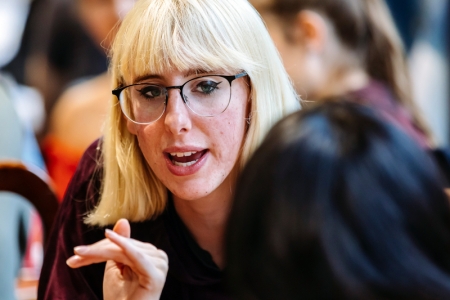
Throughout my time at Uni, my favourite aspect of the course has to be the combination of research into critical theory alongside creative work. This was because I found that I was able to apply the knowledge I’d acquired in my essays into my creative pieces too, which ultimately helped me to improve the standard of my creative pieces dramatically.
Supporting you
The amount of timetabled teaching you'll get on your degree might be less than what you're used to at school or college, but you'll also get support via video, phone and face-to-face from teaching and support staff to enhance your learning experience and help you succeed. You can build your personalised network of support from the following people and services:
Types of support
Your personal tutor helps you make the transition to independent study and gives you academic and personal support throughout your time at university.
You'll have regular contact with your personal tutor in learning activities or scheduled meetings. You can also make an appointment with them if you need extra support.
You'll have help from a team of faculty academic skills tutors. They can help you improve and develop your academic skills and support you in any area of your study.
They can help with:
- improving your academic writing (for example, essays, reports, dissertations)
- delivering presentations (including observing and filming presentations)
- understanding and using assignment feedback
- managing your time and workload
- revision and exam techniques
As well as support from faculty staff and your personal tutor, you can use the University's Academic Skills Unit (ASK).
ASK provides one-to-one support in areas such as:
- academic writing
- note taking
- time management
- critical thinking
- presentation skills
- referencing
- working in groups
- revision, memory and exam techniques
If you require extra support because of a disability or additional learning need our specialist team can help you.
They'll help you to
- discuss and agree on reasonable adjustments
- liaise with other University services and facilities, such as the library
- access specialist study skills and strategies tutors, and assistive technology tutors, on a 1-to-1 basis or in groups
- liaise with external services
Our online Learning Well mini-course will help you plan for managing the challenges of learning and student life, so you can fulfil your potential and have a great student experience.
You can get personal, emotional and mental health support from our Student Wellbeing Service, in person and online. This includes 1–2–1 support as well as courses and workshops that help you better manage stress, anxiety or depression.
Library staff are available in person or by email, phone, or online chat to help you make the most of the University’s library resources. You can also request one-to-one appointments and get support from a librarian who specialises in your subject area.
The library is open 24 hours a day, every day, in term time.
If English isn't your first language, you can do one of our English language courses to improve your written and spoken English language skills before starting your degree. Once you're here, you can take part in our free In-Sessional English (ISE) programme to improve your English further.
Course costs and funding
Tuition fees
All fees may be subject to annual increase.
- UK/Channel Islands and Isle of Man students – £9,250 a year (may be subject to annual increase)
- EU students – £9,250 a year, including our Transition Scholarship (may be subject to annual increase)
- International students – £17,200 a year (subject to annual increase)
All fees may be subject to annual increase.
- UK/Channel Islands and Isle of Man students – £9,250 a year (may be subject to annual increase)
- EU students – £9,250 a year, including our Transition Scholarship (may be subject to annual increase)
- International students – £17,200 a year (subject to annual increase)
Funding your studies
Find out how to fund your studies, including the scholarships and bursaries you could get. You can also find more about tuition fees and living costs, including what your tuition fees cover.
Applying from outside the UK? Find out about funding options for international students.
Additional course costs
These course-related costs aren’t included in the tuition fees. So you’ll need to budget for them when you plan your spending.
Costs breakdown
Our accommodation section show your accommodation options and highlight how much it costs to live in Portsmouth.
You’ll study up to 6 modules a year. You may have to read several recommended books or textbooks for each module.
You can borrow most of these from the Library. If you buy these, they may cost up to £60 each.
We recommend that you budget £75 a year for photocopying, memory sticks, DVDs and CDs, printing charges, binding and specialist printing.
If your final year includes a major project, there could be cost for transport or accommodation related to your research activities. The amount will depend on the project you choose.
During your placement year or study abroad year, you’ll be eligible for a discounted rate on your tuition fees. Currently, tuition fees for that year are:
- UK/Channel Islands and Isle of Man students – £1,385 a year (may be subject to annual increase)
- EU students – £1,385 a year, including Transition Scholarship (may be subject to annual increase)
- International students – £2,875 a year (subject to annual increase)
The costs associated with your specific destination will be discussed during your second year, as well as possible sources of additional funding.
You may need to buy items such as DVDs and MiniDV tapes to use on practical units, which cost approximately £20–£30.
You’ll need to cover the material costs for individual project work, which usually costs £50–£100.
How to apply
Apply now through Clearing
If you have your results, you can apply directly to us now to start in September 2024.
Applying for year 2 or 3
If you've already completed part of this course with us or another university and would like to apply for the second or third year with us in September 2024, use our online application form.
September 2025 applications
To start this course in 2025, apply through UCAS. You'll need:
- the UCAS course code – W810
- our institution code – P80
If you'd prefer to apply directly, use our online application form.
You can also sign up to an Open Day to:
- Tour our campus, facilities and halls of residence
- Speak with lecturers and chat with our students
- Get information about where to live, how to fund your studies and which clubs and societies to join
If you're new to the application process, read our guide on applying for an undergraduate course.
Admissions terms and conditions
When you accept an offer to study at the University of Portsmouth, you also agree to abide by our Student Contract (which includes the University's relevant policies, rules and regulations). You should read and consider these before you apply.


